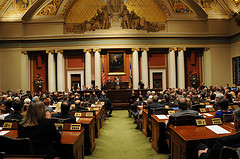

Photo by Office of Governor Mark Dayton & Lt. Governor Tina is licensed under CC BY 2.0
Like a number of other states, Texas is in the middle of a contentious legislative session. Legislators, on the downhill side of a 140-day session, have filed more than 6,300 bills and joint resolutions and tempers flare daily as disagreement seems the norm. Lawmakers are now making difficult and controversial decisions related to education, campus carry (handguns), border security, transportation, water, tax relief and a two-year budget.
Citizens who watch legislative sessions closely have to wonder what’s happening in other states. Do most states grapple with the same problems? A recent survey by CQ Roll Call revealed that there is no “blanket” list of issues that covers all states. While some have similar issues, legislators prioritize problems and issues that are unique to their region.
“The 50 State Project” by CQ Roll Call surveyed reporters in all 50 states and Washington, D.C., to determine the top issues of 2015. The top five issues, not surprisingly, included the following:
- Budget decisions were the top issue mentioned most often by reporters covering state issues;
- Education ranked second, with taxes and transportation tied for third;
- Ethics, health care and jobs came in fourth; and
- Crime, energy, infrastructure and pensions were close behind.
But for all their similarities, state needs are quite divergent. Massachusetts’ top-ranking issue is transportation. The state just suffered through one of the harshest winters in recent times, so that is understandable. Weather adversely affected rail lines and roadways, leaving commuters with few transportation options. Damages from snow and ice led the governor to seek an additional $200 million to repair roads and bridges.
While declining gas prices at the pump had consumers smiling, the downward spiral in prices created havoc in Alaska. The drop in oil production combined with gas prices that spiraled downward have the state in somewhat desperate straits. Taxes are fast becoming the #1 issue for Alaska. Expected to lose $3.5 billion in revenue in both 2015 and 2016, a statewide income tax and sales taxes are on the table for legislative discussion.
In Colorado, where infrastructure is a top priority, the state implemented its first public-private partnership (P3/PPP) infrastructure project.
Drought conditions throughout the country elevated water to a top priority of legislators in several states. In Utah, the nation’s second-driest state, lawmakers are looking at all options, including a $1 billion, 140-mile pipeline from the Colorado River to the southwest corner of the state.
Revenue shortfall problems continue in Louisiana. That has led the current administration to propose major cuts in health care and education spending, a prime reason the state is among those where reporters list the budget as a number one concern. Illinois faces budget woes as well. When the state’s temporary income tax expired in January, officials were faced with a $1.6 billion loss of funds for the current fiscal year and a $4 billion decline in the upcoming fiscal year.
The unemployment rate in Washington, D.C., remains above the national average and jobs are the key issues in the District. Officials there are focusing their attention on economic development initiatives.
Kentucky’s legislators are struggling with infrastructure. Public-private partnership legislation failed to pass for the second year in a row and the state is now exploring other funding options. The need to make up for revenue lost from declining gas tax revenues is a priority, along with a need to address infrastructure needs.
In Texas, budget issues and gun rights dominate conversations and press coverage. Legislators, looking for ways to provide property tax relief, seemed surprised by pushback from the business community because of funding cuts to basic services that would result. Legislation regarding open carrying of handguns is highly controversial. Some want to make it legal for students and others to carry handguns on college campuses. Others, including most law enforcement agencies, argue that the risks will increase significantly if that happens. There is disagreement about transportation, education, local ordinances, government contracting and more.
State legislative sessions do not appear as contentious as sessions of Congress, but there is open hostility, deeply divided beliefs about government and disagreement about basic issues in many states. It is a difficult time to be in politics…and it is occasionally even more difficult to watch from the sidelines.
